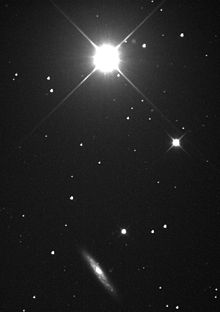NGC 3877
Appearance
| NGC 3877 | |
|---|---|
 NGC 3877 (Sloan Digital Sky Survey) | |
| Observation data (J2000 epoch) | |
| Constellation | Ursa Major |
| Right ascension | 11h 46m 07.8s[1] |
| Declination | +47° 29′ 41″[1] |
| Redshift | 0.002987[1] |
| Heliocentric radial velocity | 895 ± 4 km/s[1] |
| Distance | 50.5 ± 4.2 Mly (15.5 ± 1.3 Mpc)[2] |
| Apparent magnitude (V) | 12.1[1] |
| Characteristics | |
| Type | Sc[1] |
| Apparent size (V) | 4'.4 × 0'.8[1] |
| Other designations | |
| UGC 6745, PGC 36699[1] | |
NGC 3877 is a type Sc spiral galaxy that was discovered by William Herschel on February 5, 1788.[3] It is located below the magnitude 3.7 star Chi Ursae Majoris in Ursa Major.[3][4]

Supernova
[edit]The Type IIn supernova SN 1998S[3][5] is the only supernova that has been observed within NGC 3877.
Environment
[edit]NGC 3877 is a member of the M109 Group, a group of galaxies located in the constellation Ursa Major that may contain over 50 galaxies. The brightest galaxy in the group is the spiral galaxy M109.[6][7][8]
References
[edit]- ^ a b c d e f g h "NASA/IPAC Extragalactic Database". Results for NGC 3877. Retrieved 2006-11-10.
- ^ "Distance Results for NGC 3877". NASA/IPAC Extragalactic Database. Retrieved 2010-05-16.
- ^ a b c "NGC 3877". SEDS, the Students for the Exploration and Development of Space. Retrieved 2010-05-16.
- ^ "WikiSky DSS2 image of Chi Ursae Majoris". Wikisky. Retrieved 2010-05-16.
- ^ "NASA/IPAC Extragalactic Database". Results for SN 1998S. Retrieved 2006-11-10.
- ^ R. B. Tully (1988). Nearby Galaxies Catalog. Cambridge: Cambridge University Press. ISBN 978-0-521-35299-4.
- ^ A. Garcia (1993). "General study of group membership. II - Determination of nearby groups". Astronomy and Astrophysics Supplement. 100: 47–90. Bibcode:1993A&AS..100...47G.
- ^ G. Giuricin; C. Marinoni; L. Ceriani; A. Pisani (2000). "Nearby Optical Galaxies: Selection of the Sample and Identification of Groups". Astrophysical Journal. 543 (1): 178–194. arXiv:astro-ph/0001140. Bibcode:2000ApJ...543..178G. doi:10.1086/317070. S2CID 9618325.
External links
[edit]Wikimedia Commons has media related to NGC 3877.
- NGC 3877 on WikiSky: DSS2, SDSS, GALEX, IRAS, Hydrogen α, X-Ray, Astrophoto, Sky Map, Articles and images
